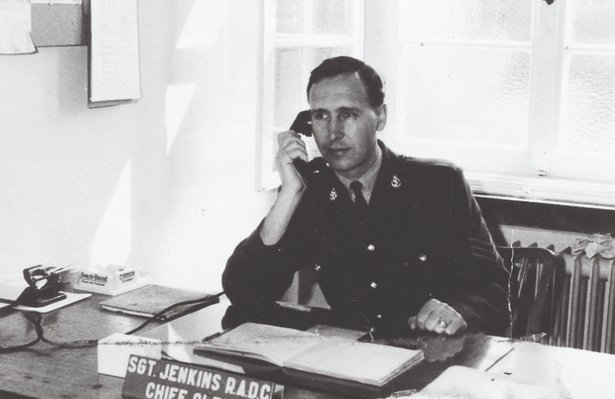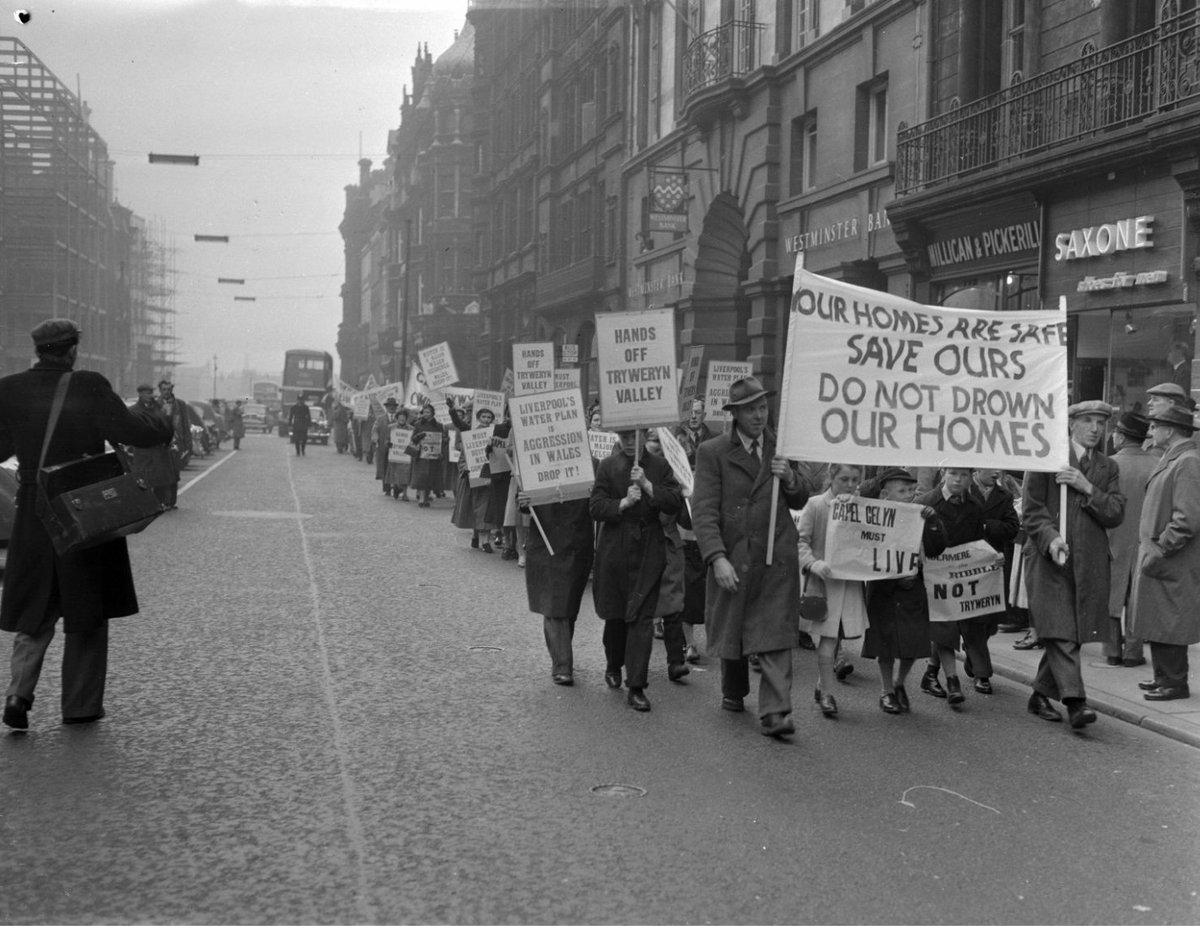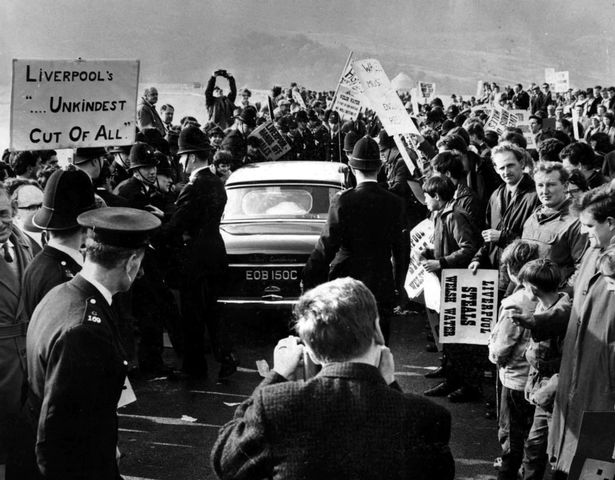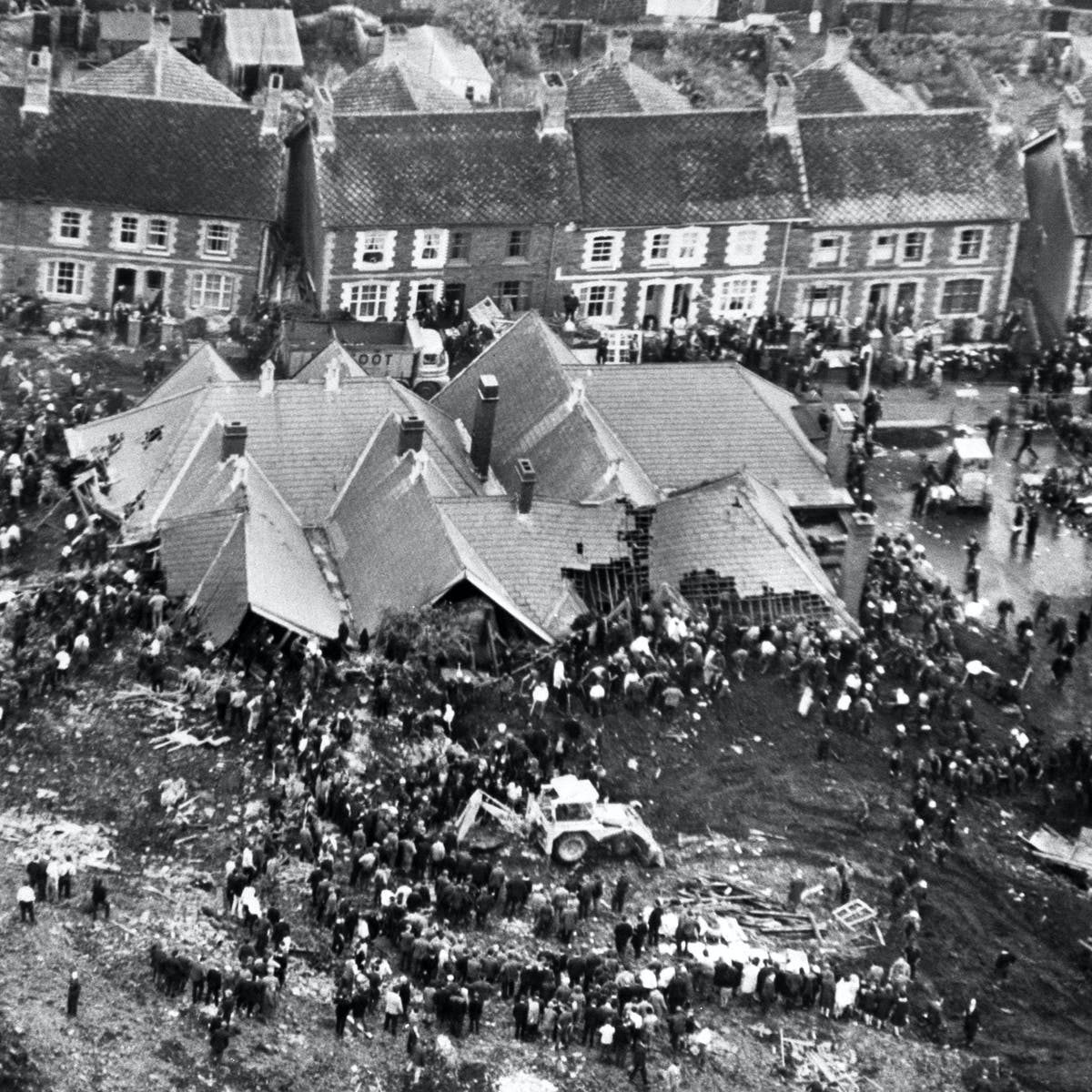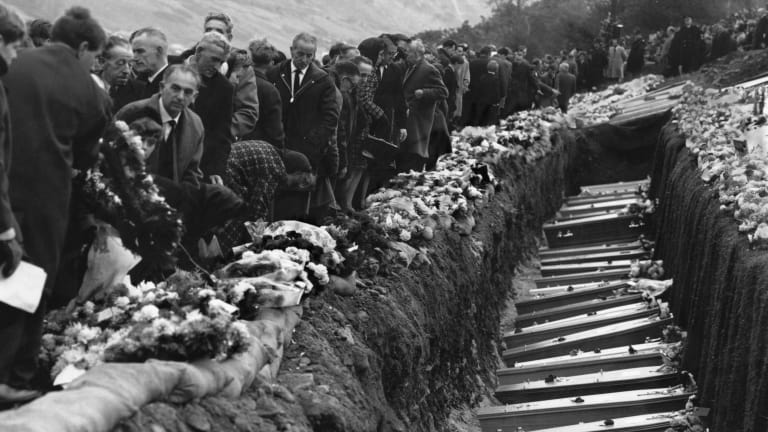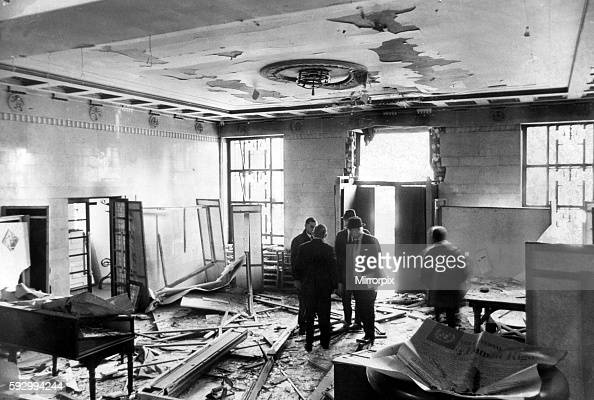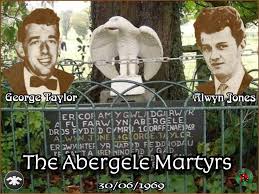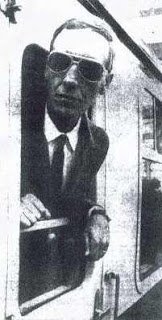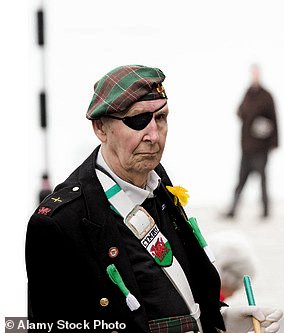A thread on John Barnard Jenkins - The Reluctant Revolutionary 
P.S - yes this man is as badass as his photo suggests.

P.S - yes this man is as badass as his photo suggests.
John Jenkins was born in Caerdydd on the 11th of March, 1933 and grew up in a village called Penybryn, near Gelligaer. He attended Bargoed Grammar School but left at 13 to take up a job as a blacksmith's apprentice.
It seems it was at Bargoed Grammar School that Mr Jenkins' interest in Welsh affairs was piqued. Apparently, Jenkins quickly grew disillusioned with what the school was teaching - or not teaching so to speak.
"On arrival I expected to learn about Welsh history. But it wasn't taught. We were taught about King Alfred and the blackened cakes and Bruce and the spider but we weren't taught about the things that really mattered to us, such as where we lived and how we got to where we were."
He became increasingly interested in Welsh history, often exploring churches and ruins in his free time to learn more. One particular discovery shaped his mindset during this period.
In school he was taught that Christianity had been introduced to Britain by Augustine in 597 AD, but soon discovered local Christian relics that pre-dated this.
"The policy was to rubbish the older Celtic Church and replace it with an English-centric one."
"The policy was to rubbish the older Celtic Church and replace it with an English-centric one."

John Jenkins was a bit of a loner in school, finding himself disconnected from others and their pastimes. He started his apprenticeship with a local blacksmith in Bargoed and worked the job for 2 years. In his spare time, Jenkins read books on Welsh History.
Dissatisfied with his work environment and having split from a girl he later described as his "true love", Jenkins decided to enlist in the British Army. He visited the Army recruitment office in Cardiff on 30 November 1950, assigned to the Royal Army Dental Corps.
He completed basic training at Aldershot Garrison before his first posting in Warminster. He was soon moved overseas, shortly before his 21st birthday, initially being assigned to Egypt before swapping his posting with a fellow recruit who had been selected to go to Austria.
He was posted to Berlin soon after arrival and was stationed in the British Army garrison set up in the Olympiastadion. He was promoted to sergeant during his time in Germany and was earning enough money to help support his family in Wales, including sending food parcels home.
Jenkins returned to Aldershot in 1955 and requested a voluntary discharge from the army. He was demobbed on 29 November the same year. He was offered a well-paid job at a local factory near his home in Penybryn, however the site closed soon after due to an economic downturn.
He took a job at a steelworks in Cardiff before deciding to emigrate to South Africa to work in the country's gold mines. Jenkins was required to have at least one year's experience of mining, so began working at Penallta Colliery.
He remained there for several months until suffering a minor accident while riding his motorcycle. Jenkins then worked as a student nurse at East Glamorgan Hospital where he met Thelma Bridgeman. The pair married at St. Matthias' Church in Treharris in October 1958.
Jenkins enlisted in the Territorial Army around the same time as the Tryweryn Bill. The bill, put forward by the Liverpool Corporation, flooding the Tryweryn Valley and the community of Capel Celyn to create a reservoir, increasing the water supply for the North-West of England.
This was met with opposition from Wales; Welsh MPs voted against the Bill and street protests were held in Liverpool. Despite this, the bill passed. The decision increased support for Welsh nationalism and is credited with a rise in support for Plaid Cymru
In July 1958, Jenkins chose to re-enlist in the British Army after finding the quality of life provided by his work in civilian life lower than when in service. He rejoined the Dental Corps as a non-commissioned officer and was posted to Cyprus.
He witnessed firsthand the successful incursions of the EOKA, a guerilla outfit that opposed British rule. Jenkins' first child was born in 1959 during his posting, but as British rule drew to an end in Cyprus, the military presence in the country was greatly reduced.
One of the first actions against the state that Jenkins participated in was a land-buying scheme intended to disrupt the planned creation of the Clywedog Reservoir. The subcommittee purchased land and sublet parts to contributors, including Jenkins.
The plan was overruled by Parliament in a decision derided by Jenkins. He stated "they simply changed the law. This was the final thing which convinced me that constitutionally speaking, you can't win against people who own all judicial eventualities."
His second child was born shortly afterwards and the family chose to return to South Wales to provide the children with an education at a Welsh-medium school. Jenkins remained on deployment in Germany for nearly a year away from his family.
In October 1964, during a spell in Wales on leave from the army, Jenkins met Phil Williams and David Walters, a member of Mudiad Amddiffyn Cymru who had previously been convicted over an attempt to sabotage the electricity supply at Llyn Celyn. 



Walters organised a meeting with Jenkins, along with his accomplice in the Llyn Celyn incident David Pritchard. Jenkins later recalled that the meeting was "disguised as a chat, but it was really an interview. It was quite intense."
A few days after the meeting, Pritchard contacted Jenkins with an offer, not only to join MAC, but to become the leader of the group. He immediately set about planning ways of displaying the opposition of the Welsh people to the Tryweryn Bill and subsequent similar propositions.
He feared that arming the MAC would see them considered in the same vein as the Irish Republican Army, commenting "Shooting people was all very well, but it would not have earned the hearts and minds that I thought a campaign of militant activity should be all about."
In October 1966, Jenkins watched TV news broadcasts of the Aberfan disaster. A spoil tip situated above the town had collapsed, sending a cascade of slurry towards Aberfan. It engulfed a local primary school and killed 144 people, most of whom were children at the school.
Jenkins was infuriated by the response of the National Coal Board and other dignitaries. In a 1969 police interview, he stated "I felt that Aberfan was the ultimate expression of English disinterest in Wales."
R.I.P to all that lost their lives that fateful day!

R.I.P to all that lost their lives that fateful day!


He started a cell structure throughout Wales, with only Jenkins knowing the identity of each cell's leader and providing basic explosives training to each one. Such was the success of the cell structure that it has been reported that the IRA later adopted the system! 





In February 1966 members of the FWA approached the MAC to build an explosive device to be used in targeting the Elan Valley water pipeline that supplied Birmingham. The FWA laid the bomb, but failed to connect the primers properly during assembly and the device failed to detonate
The next target selected was a water pipeline in Llanrhaeadr-ym-Mochnant that transported water 70 miles from a reservoir near the River Vyrnwy to Liverpool. Jenkins had studied the site extensively under the guise of sightseeing trips to the nearby Pistyll Rhaeadr.
He met Pritchard in Rhayader several days before the planned action, where Pritchard supplied him with nitroglycerin and around 500 detonators. Jenkins and another MAC member, Ernie Alders, travelled from Wrexham to the site on 30 September 1967 and set up the device.
The bomb was successfully detonated at 2 a.m. using a timer, rupturing the water pipeline and causing an estimated £10,000 worth of damage. Jenkins later recalled that he was sad that it "had come to this" but had been spurred on by a "democratic deficit"
Two months after the pipeline bombing, a second device was detonated at 4:04 a.m. on 17 November 1967 outside the Temple of Peace in Cardiff causing damage to the front hall. The MAC operative who undertook the action has never been identified.
The Temple of Peace had been selected as it was due to host a meeting of the Investiture Organising Committee and also as a planned protest by the Welsh Language Society was due to take place later the same day.
On 5 January 1968 at the Snowdonia Country Club in Penisa'r Waun was bombed. Selected as it had recently been constructed by a Manc-based businessman despite opposition from locals. Jenkins stated that the site highlighted the perceived "cultural rape of Wales".
The attack was carried out by two MAC members, Alwyn Jones and George Taylor. Police arrested Williams, who had previously served a year in prison for his part in actions at the Tryweryn site, before releasing him on bail on 29 February.
Williams and Jenkins met the following day in Loggerheads, Denbighshire where Jenkins was leading a procession of his marching band for Saint David's Day. Williams fled to the Republic of Ireland the next day.
With their supply of explosives provided by Pritchard exhausted, Jenkins and Alders broke into Hafod Quarry near Wrexham. The site's security system had been disabled by an employee who was known to the MAC, allowing the pair to steal nearly a quarter of a ton of materials. 



Their next target was a tax office in Llanishen; Jenkins and Alders delivered a 10-pound explosive device to Cardiff MAC members a week before the attack, which took place on 24 March 1968. The first police officer to arrive at the tax office described a scene of devastation.
A secret press conference was scheduled in which three journalists, Emyr Jones of the Wrexham Leader, Harold Pendlebury of the Daily Mail and freelance writer Ian Skidmore were allowed into a darkened room where Jenkins sat.
To verify his identity, he described the devices that had been used in the Llanishen attack. In the conference, Jenkins threatened to target the upcoming investiture of Prince Charles, which immediately attracted the attention of English authorities.
The growing threat of Welsh militancy prompted the establishment of a special police task force, led by Jock Wilson, which became known as the "Shrewsbury Unit" due to the location of its headquarters.
George Thomas was appointed Secretary of State in April 1968 and confidently predicted that the violence had ended. Seven weeks later, the MAC bombed Thomas' office at Crown Buildings, Cathays Park, shattering more than 200 windows and causing an estimated £5,000 worth of damage.
Between May and July 1968, the MAC carried out two more bombings. The first caused damage to the concrete support of a water pipeline between Lake Vyrnwy and Liverpool. The second targeted a Liverpool Corporation viaduct at the Chester–Warrington railway crossing.
The site employed full-time security and had been described as "unbreachable" but the MAC explosive device was successfully detonated, causing the pipeline to shatter. The resulting breach sent a fountain of water around 300 feet into the air and halved the water supply.
The only further bombing carried out by the MAC in 1968 occurred on 2 December when the Elan Valley pipeline was targetted again, this time near Stourbridge. An explosive device was detonated in the early hours of the morning which caused the water supply to be severed.
In 1969, the MAC was approached by the Stasi, East Germany's intelligence agency. An alliance with the Breton Democratic Union was also considered, an idea raised due to links with the poet Harri Webb, but Jenkins rejected both of the ideas over security concerns.
On 30 June 1969, two members of the MAC, Alwyn Jones and George Taylor, were killed when a bomb they had been intending to place outside government offices in Abergele exploded.
R.I.P to Alwyn Jones and George Taylor, the Abergele Martyrs!

R.I.P to Alwyn Jones and George Taylor, the Abergele Martyrs!


The MAC's plans continued nonetheless, with a second explosive being planted in the garden of the Chief Constable of Gwynedd police. The device was timed to detonate at 2:15 p.m., moments before a 21-gun salute began in order to undermine the ceremony.
Another device, supplied to a cell leader in Caernarfon days beforehand, was planted in an iron forge near the castle but failed to go off; Jenkins had instructed the member to place the bomb "where it won't hurt anybody, but will cause symbolic damage."
The MAC carried out an attack on the South Stack Relay Station, a comms network which was a link between British authorities and soldiers operating in Northern Ireland during the 1960s. The attack was planned as a show of protest against the ongoing British actions in Ulster.
Jenkins and Alders were arrested at their homes on 2 November 1969 and taken to Ruabon police station. Jenkins later stated that he gave the name of his solicitor to the police but the officers made no attempt to contact him.
Jenkins had effectively been found guilty of high treason. He was sentenced to ten years for his crimes; Alders received six, despite his plea deal originally being intended to limit his sentence to five years.
After sentencing, Jenkins was moved to HM Prison Birmingham. Authorities attempted to extract the names of other MAC members from him, but he refused, although he did reveal the location of the unexploded device at Llandudno Pier which had lain undetected since the investiture.
He was moved again, where he began writing articles that were published in Welsh Nation, a Plaid Cymru periodical where his friend was the editor. Several members of the party soon complained about his inclusion and he was ultimately banned from the publication.
He was moved to HM Prison Albany, along with members of the IRA including Joe Cahill, after the prison authorities received information that the IRA were planning on landing a helicopter in the prison grounds to pick up its incarcerated members as well as Jenkins. 



Jenkins was released from prison on 15 June 1976. During his last weeks in prison, he had been approached by a friend about taking up a job as an assistant manager in a computer department of the Iranian government in Tehran.
delays in processing his inoculations and travel documents by officials, deliberately according to Jenkins, resulted in the offer expiring. He returned to North Wales, also purchasing a ferry ticket to Dublin to confuse authorities about his movements.
In 1979, he applied to Swansea University for a one-year course on Social and Community Work. Jenkins attended an interview for the course in February 1980, during which he disclosed his previous activities with the MAC and time in prison. He was rejected from the course.
During the period between his application and course interview, the Welsh nationalist group Meibion Glyndŵr launched an arson attack on English-owned holiday homes in Wales. The decision had been vetoed by the University Committee, led by Robert Walter Steel.
Who falsely claimed that he had been involved in the Meibion Glyndŵr attack. An irate Jenkins gave a television interview the following month to Nationwide in which he discussed the attack.
This, coupled with an anonymous note claiming responsibility for the attack that was signed by someone claiming to be from the MAC, led Jenkins to be one of numerous people arrested as part of Operation Tân. He was later released without charge.
Jenkins worked for SWAPAC until September 1981, leaving his position to undertake a two-year diploma course in Sociology and Humanities at the University College of South Wales. He also began studying for a certificate in social work.
During this time, a series of bombings were carried out around Wales. Jenkins was questioned during the investigation and held for numerous days as police alleged that he had provided one of the suspected perpetrators, Dafydd Ladd, with the address of a safehouse.
Jenkins had previously met Dafydd Ladd at Albany prison where they served time together After being held for days, Jenkins began to fear that he would lose his place on his university course and asked his solicitor for advice on how the situation could be brought to an end.
Jenkins confessed to providing the address, although this was not true and was only done to ensure he would be released to continue his studies. Seeking to distance himself from any connections, he became a social worker in London. He graduated from his university course in 1983.
In his final year of studies, Jenkins had travelled back and forth to Cardiff to attend preliminary hearings over the charge of assisting Ladd on a £5,000 bail. The case concluded in November 1983 at Cardiff Crown Court.
The charge was expected to result in a fine, with his solicitor being assured as such by Tasker Watkins, who was then a senior judge in the region. To Jenkins' surprise, he was given a two-year custodial sentence.
He subsequently returned to social work for Barking and Dagenham London Borough Council, a position he held for 18 months before the department was alerted to Jenkins' criminal past by a police tip-off.
He was asked to divulge the nature of his previous offences, but refused stating that the council "was not an arm of the state". The council issued an ultimatum to Jenkins to disclose his history and he instead chose to resign from the role.
Back in 2012 an article was written in which the author contacts John Jenkins and receives a letter in return. A good read! https://www.slow-journalism.com/from-the-archive/i-curse-the-day-i-was-born-a-welshman#:~:text=%E2%80%9CI%20curse%20the%20day%20I%20was%20born%20a%20Welshman.,do%20so%20I%20do%20them.
An interview with John Jenkins 

John jenkins speaking last year
1st March 2013. John with the Cambria Band at the first ever Saint David's Day Parade at Aberystwyth as bands, marchers and primary school children celebrated the Patron Saint of Wales's Day.
To conclude this thread on Mr John Barnard Jenkins I just have this to say. Thank you from the bottom of my heart the "reluctant revolutionary" for standing up for Cymru! A true hero of Wales and oppressed people everywhere 






 Read on Twitter
Read on Twitter
